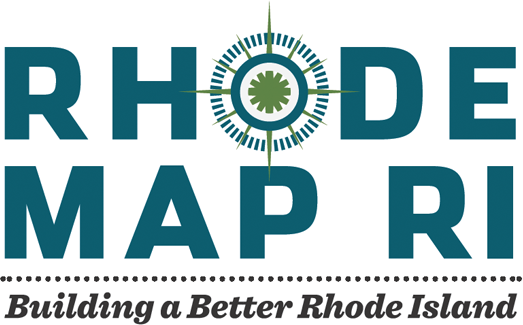Scott Wolf, the executive director of Grow Smart Rhode Island, said there were some big wins for sustainable and equitable development in the last legislative session. RhodeMapRI was not one of them, he acknowledged.

“A lot of the economic development proposals that we thought were good for smart growth passed,” Wolf said. “Those are embodied primarily in Governor Raimondo’s economic development package.”
He mentioned funding to incentivize development on the I-195 land, a fund for streetscape improvements on main streets of cities and towns, special incentives towards transit development, and others.
But the Rebuild RI tax credit could be the most impactful piece of the governor’s economic development package, he said. In its final form, there are opportunities for small historic rehabilitation projects, something that Grow Smart advocated for, and spoke to the Raimondo administration about.
“If the Rebuild RI tax credit does provide significant opportunities for large and small historic rehab projects, then that could be the single most important item,” Wolf said. “It provides continuing state incentives for redeveloping some of our tremendous collection of historic buildings, most of which are located in urban areas, many in distressed urban areas.”
Wolf added that the tax credit program also provides funding for the redevelopment of vacant lots in cities and towns. These lots could be turned into a number of things for public use, but Grow Smart is advocating for some to be converted into grocery stores, as many urbanites have difficulties accessing one.
“As a group that wants to see development occur primarily in cities versus rural areas, we think that this Rebuild RI tax credit is going to stimulate that kind of development,” Wolf said.
Looking toward the future, Grow Smart has plans for the short and long term. For the rest of the year, they’ll be focusing on educating towns and municipalities about the new tools they have, such as the Rebuild RI tax credit, to implement smart growth standards in their public centers.
“Our focus for the next four or five months is going to be to try to make sure that municipalities and developers, both for profit and nonprofit, that are interested in rehabilitating specific historic structures, fully understand how they can facilitate that through the Rebuild RI program,” Wolf said.
During this time, Grow Smart will become a resource for these groups to ensure that their process goes smoothly, but also to get as many historic rehab projects approved as possible. They’ll also be providing assistance for some of the bond issues that were passed last November, especially an environmental bond that includes $5 million for the redevelopment of contaminated sites, or brown fields. Wolf said that this bond is a big step forward, since it’s the first time that state money has gone toward such a project.
Wolf added that Grow Smart also plans to work with the governor’s administration to develop a technical assistance for local governments so they can better use the new tools that have been given to them for redevelopment, such as tax increment financing, which can be used to put the funds together for brownfield development.
In the long term, Wolf said they have several goals, but they all boil down to building a stronger economy, while maintaining Rhode Island’s personality. This all includes employment for city residents, strengthening farms and locally produced agriculture, and a more user-friendly transportation system.
“In a broad sense, our in Rhode Island, and the work nationally in the smart growth movement, is about changing the predominant development pattern in America, which has existed for the past 70 years or so, which has been a very auto dependent, suburban oriented development pattern,” he said. “We’re not anti suburban, and we’re not anti auto, but we think that we need a more balanced approach than what we’ve had in the state and in the country for decades.”
A successful year can’t happen without some marked failures, though. Grow Smart was a staunch supporter of Governor Raimondo’s RhodeWorks legislation, which tore a rift between the House and Senate last session. While the revised bill passed in the Senate, it didn’t even reach the floor in the House, with Speaker Mattiello urging for further study. The bill would use tolls on tractor-trailer trucks to cover the costs of rebuilding deficient bridges, as well as support a more modern transit system.
“We’re disappointed it didn’t pass both houses, but we think there’s a good chance it’s going to be approved either later this year or early next year. We’re working with the Raimondo administration, especially the state department of transportation, on that proposal,” Wolf said.
He was also disappointed that there was not a specific and significant commitment to multi-year funding for historical rehabilitation projects added to the state historic tax credit program.
RhodeMap RI was presented another sticky situation for Grow Smart. While it did pass as legislation, Wolf explained that there was so much controversy around the bill that it became hard to use it as the basis for any policy decisions. The bill included expansions for affordable housing, which conservative activists called “socialist,” fearing the takeover of municipal zoning regulations.
Although the plan was ultimately approved, Grow Smart’s main concern after the public uproar it caused was that it would sit on a shelf and have no policy effect whatsoever. However, Governor Raimondo’s economic development package includes many of the basic priorities that Rhode Map sought to achieve, and which Grow Smart supports.
“Our main commitment was to the goals and the proposed policies of RhodeMap, not to RhodeMap, the name or the brand,” Wolf said. “Our goal this sessions was to get as many of the initiatives that are in the spirit of Rhode Map approved as possible, and a lot of the governor’s economic development package is in that spirit.”
“If decoupling these ideas from RhodeMap is what’s necessary, politically, to have them enacted, then that’s a small price to pay,” Wolf added.
Even with the stigma surrounding RhodeMap, and the limbo that RhodeWorks currently lies in, Wolf said he is still very comfortable calling this legislative session a success for Grow Smart. As far as next year is concerned, their goals are still in the planning stage. For now, Grow Smart celebrates what they’ve already won, and not the battle ahead.




